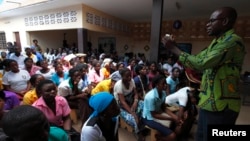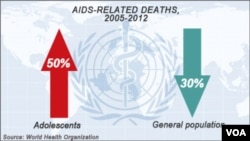DAKAR —
The World Health Organization (WHO) says that only 10 percent of young men and 15 percent of young women in sub-Saharan Africa know their HIV status. The WHO say governments need to review their laws to make it easier for adolescents to get tested for HIV and to receive counseling and treatment.
More than 2 million adolescents between the ages of 10 and 19 are living with HIV worldwide. Approximately 70 percent of these young people are in sub-Saharan Africa.
The WHO says in a report being released Monday that despite a 30 percent drop in the global number of HIV-related deaths over the last decade, the number of HIV-related deaths in the adolescent age group went up by 50 percent during that same time.
Craig McClure, associate director and chief of the United Nations Children’s Fund’s (UNICEF) HIV/AIDS Division, said (over Skype) that more attention needs to be given to adolescents when it comes to HIV testing and care.
"A lot of the focus in recent years has been on scaling up HIV testing for pregnant women, providing them with treatment to protect their own health and prevent transmission to their babies," he said. "We need to extend those efforts through to adolescents to make sure that children remain HIV-free from birth right through to adulthood and that those [adolescents] that are living with HIV have access to the treatment and care they deserve."
McClure says one of the first steps is making sure more young people know their status.
In many sub-Saharan African countries, the law prevents anyone under the age of 18 from getting tested for HIV without parental consent.
"We obviously would like adolescents, young people, to be able to discuss with their families their health needs, but we know that’s not always possible," he said. "So making it easier for adolescents to get HIV testing, either through the community or through health services, is a really important way of ensuring that they are linked to either care or to prevention services."
McClure says there is also a lack of youth-friendly HIV-testing and counseling services throughout sub-Saharan Africa, and not enough youth-led, government-funded programs to raise awareness among adolescents about the importance of HIV testing as a gateway to services.
He says keeping adolescents in HIV care as they navigate the transition from childhood to adulthood is particularly challenging. They often need more support than adults to stick to their treatment plan and more help dealing with social pressures from peers.
To help adolescents who are either living with HIV or are at risk of infection get the care they need, the WHO worked with UNICEF and other partners to create guidelines for tailoring HIV testing and care services to adolescents.
The report calls on governments to pay more attention to adolescents within their HIV programs and to review their polices in relation to age of consent.
More than 2 million adolescents between the ages of 10 and 19 are living with HIV worldwide. Approximately 70 percent of these young people are in sub-Saharan Africa.
The WHO says in a report being released Monday that despite a 30 percent drop in the global number of HIV-related deaths over the last decade, the number of HIV-related deaths in the adolescent age group went up by 50 percent during that same time.
Craig McClure, associate director and chief of the United Nations Children’s Fund’s (UNICEF) HIV/AIDS Division, said (over Skype) that more attention needs to be given to adolescents when it comes to HIV testing and care.
"A lot of the focus in recent years has been on scaling up HIV testing for pregnant women, providing them with treatment to protect their own health and prevent transmission to their babies," he said. "We need to extend those efforts through to adolescents to make sure that children remain HIV-free from birth right through to adulthood and that those [adolescents] that are living with HIV have access to the treatment and care they deserve."
McClure says one of the first steps is making sure more young people know their status.
In many sub-Saharan African countries, the law prevents anyone under the age of 18 from getting tested for HIV without parental consent.
"We obviously would like adolescents, young people, to be able to discuss with their families their health needs, but we know that’s not always possible," he said. "So making it easier for adolescents to get HIV testing, either through the community or through health services, is a really important way of ensuring that they are linked to either care or to prevention services."
McClure says there is also a lack of youth-friendly HIV-testing and counseling services throughout sub-Saharan Africa, and not enough youth-led, government-funded programs to raise awareness among adolescents about the importance of HIV testing as a gateway to services.
He says keeping adolescents in HIV care as they navigate the transition from childhood to adulthood is particularly challenging. They often need more support than adults to stick to their treatment plan and more help dealing with social pressures from peers.
To help adolescents who are either living with HIV or are at risk of infection get the care they need, the WHO worked with UNICEF and other partners to create guidelines for tailoring HIV testing and care services to adolescents.
The report calls on governments to pay more attention to adolescents within their HIV programs and to review their polices in relation to age of consent.





